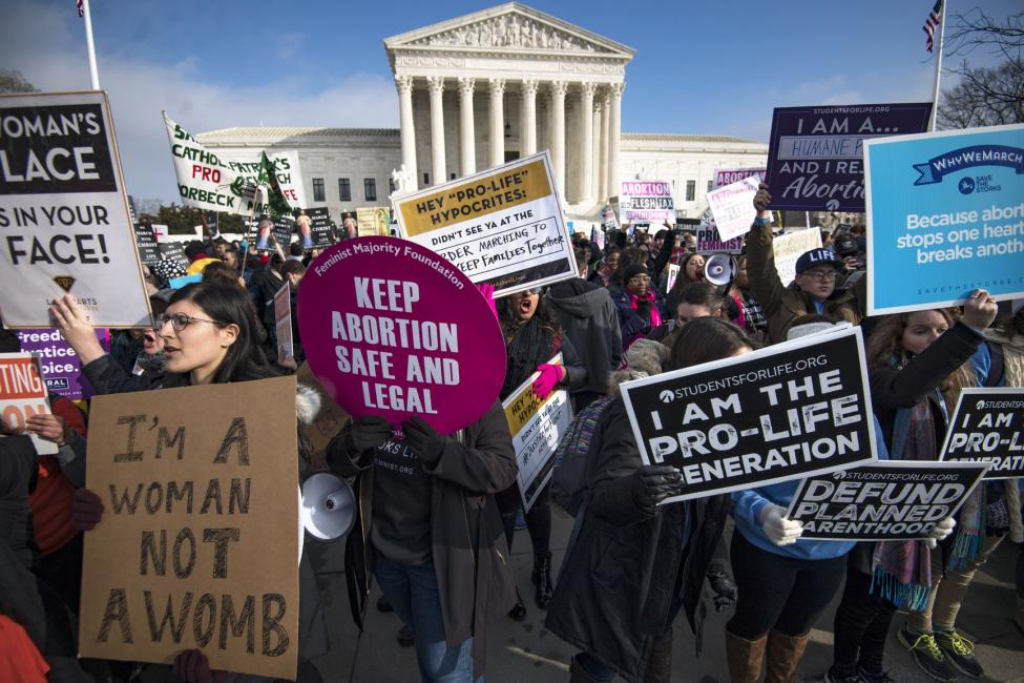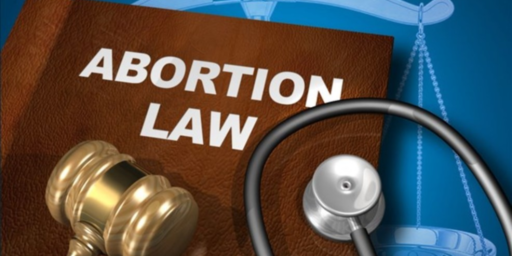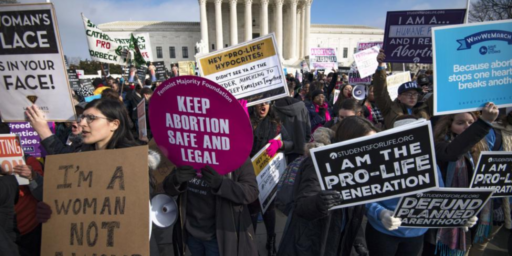Lawsuit Filed Against Alabama’s Plainly Unconstitutional Abortion Law
The American Civil Liberties Union has filed a lawsuit against Alabama's patently unconstitutional abortion law.

The American Civil Liberties Union, joined by Planned Parenthood, has filed a lawsuit challenging the incredibly restrictive abortion law that would effectively ban all abortions in the state except in cases where the mother’s life was in danger, arguing that the new law is a far too wide-reaching effort to overturn Supreme Court decisions that are more than forty years old:
Planned Parenthood and the American Civil Liberties Union announced Friday that they have filed a federal lawsuit over Alabama’s near-total abortion ban, which makes nearly all instances of performing an abortion a felony.
“The Alabama legislature has been pushing abortion care further and further out of reach for years with medically unnecessary and politically-motivated restrictions, and this extreme abortion ban shows us just how far they’ll go to push their anti-abortion agenda,” said Alexa Kolbi-Molinas, an ACLU Reproductive Freedom Project attorney, in a press release.
The suit follows Gov. Kay Ivey’s signing of the bill that makes it a felony for a doctor to perform or attempt an abortion during any stage of pregnancy unless the mother’s health is at risk.
The law, which does not make exceptions for rape and incest, was approved by the state’s Senate last week after a combative floor debate. The bill is the most stringent abortion law in the nation and is aimed at challenging the 1973 Supreme Court ruling Roe v. Wade that protects the right to abortion.
Following last week’s Senate decision, hundreds of demonstrators marched to the Alabama Capitol in protest.
“The ACLU will not stand by while politicians emboldened by President Trump’s anti-abortion agenda exploit out health and our lives for political gain,” she said in Friday’s press release.
Randall Marshall, the executive director of ACLU’s Alabama chapter, said the lawsuit is designed to ensure the abortion bill “never takes effect.”
The ACLU, Planned Parenthood Federation of America and the ACLU of Alabama filed the suit together in the U.S. District Court of the Middle District of Alabama.
Kolbi-Molinas called the law “blatantly unconstitutional,” and the suit states that by criminalizing abortions the Alabama statute “directly conflicts” with Roe v. Wade.
“Enforcement of the Ban will thereby inflict immediate and irreparable harm on Plaintiff’s patients by violating their constitutional rights, threatening their health and well-being, and forcing them to continue their pregnancies to term against their will,” the lawsuit states.
Alabama House Rep. Terri Collins, who sponsored the bill, told NBC News after it was approved by the Senate that legislators wanted to address the language in Roe v. Wade and revisit the question of whether an unborn baby is considered a person.
More from The Guardian:
Civil rights groups have filed a lawsuit to stop Alabama from implementing a law making abortion a crime at any stage of pregnancy.
The lawsuit, brought by the American Civil Liberties Union (ACLU) and Planned Parenthood Federation of America on behalf of Alabama abortion providers, seeks to block the near-total abortion ban before it can take effect.
It came as Missouri’s governor, Mike Parson, signed a ban on abortions after eights weeks of pregnancy on Friday,without exceptions for cases of rape or incest. States including Kentucky, Georgia, Ohio and Mississippi have also enacted strict limits on abortion, banning it after about six weeks into pregnancy.
(…)
Alabama’s law, approved by the legislature and signed by the governor, Kay Ivey, earlier this month, is the strictest in the US, and threatens doctors with felony charges and up to 99 years in prison for performing an abortion, with no exception for rape and incest. It allows abortions only if there is a serious threat to the woman’s health.
The lawsuit argues that the ban blatantly violates the supreme court’s landmark ruling legalizing abortion in the Roe v Wade case – which supporters of the legislation have acknowledged is the case. Their hope is to get to the high court and get that ruling overturned.
Dr Yashica Robinson, owner of Alabama Women’s Center and one of the plaintiffs in the case, said her patients “already have to overcome so much just to get to our doors, and this law further shames them, punishes providers like myself and stigmatizes essential healthcare.
“Alabama has a long track record of passing laws designed to close clinics and push abortion care out of reach, and just like we have before, we will fight for our patients and do all we can to stay open,” she said.
Both sides expect the legislation to be blocked by lower courts, which must follow supreme court precedents. The complaint was filed on Friday in US federal court for the middle district of Alabama. It asks for an order declaring the ban unconstitutional and blocking it from being enforced.
“Make no mistake: abortion remains – and will remain – safe and legal in Alabama,” said Randall Marshall, executive director of the ACLU of Alabama. “We hope our state’s elected leaders take note and stop using taxpayer dollars on a legal gamble that they know is unconstitutional and unenforceable.”
Alabama’s attorney general, Steven Marshall, named as the lead defendant in the suit, did not immediately respond to a request for comment.
The argument in the Complaint itself is, of course, fairly straightforward. The Alabama law is a direct attack on the Supreme Court’s established precedents on this issue in Roe v. Wade and Planned Parenthood v Casey. Those precedents were effectively reaffirmed in Whole Women’s Health v. Hellerstadt et al, a case in which a 5-3 Supreme Court struck down a series of Texas laws that were clearly designed to make it difficult for abortion clinics to operate in the state. Indeed, during the debate in the state legislature, the co-sponsors and supporters of the bill admitted on the record that the law’s sole purpose is to try to challenge the precedent in Roe, Casey, and Hellerstadt. Essentially this means that whatever argument they might make in Court setting forth a basis for the law is nothing but a lie. The law exists solely as a vehicle to overturn those cases and should be rejected for precisely that purpose.
Under these precedents, women generally have an unrestricted right to an abortion during the first and second trimesters. It is only during the third trimester when the fetus has reached the point where it could possibly survive outside the womb, that the courts have recognized that the states have an interest in protecting fetal life that permits restrictions on the right to an abortion. In those cases, abortions are generally only permissible if the mother’s life is in danger or if there is a fetal deformity that would make it impossible for the fetus to survive outside the womb that the law recognizes a right to terminate the pregnancy. In that respect, it’s worth noting that the vast majority of abortions in the United States take place in the first trimester and that most of those take place within the first eight weeks of pregnancy. This suggests that the Court in Roe more or less got the analysis regarding the timing of abortion correct and that there’s no good reason to upset that precedent.
Under Alabama’s law, no woman would be able to get an abortion anywhere in the state except in those cases where such a procedure was medically necessary to save her life. This law, therefore, differs significantly from other recently passed laws that have sought to ban abortions after about 20 weeks or even those that purport to ban the procedure after the detection of a fetal heartbeat. In those cases, a woman would at least theoretically be able to get an abortion in the first trimester and for a short time into the second trimester. The Alabama law would not even make it possible to get an abortion during that period, which is when the vast majority of abortions in the United States take place in any case.
Here’s the Complaint:
Robinson Et Al v. Marshall … by on Scribd






Proud member since 2002.
Considering how SCOTUS usually picks cases, I remain befoggled as to why the people behind these abortion bans think that they’re going to have a better chance the more restrictive the laws are. It’s just more likely to get thrown out at a lower court.
What’s next? Putting an abortion ban together with a “rape of women doesn’t exist” alt-right argument?
@grumpy realist:
I agree that SCOTUS is unlikely to simply overturn Roe on the basis of a wildly unpopular law in Alabama or another extreme state. But they’re going for a complete overturn of Roe, not simply pushing the envelope on Casey.
Or, from the perspective of the movement, Doug’s headline is wrong. The law isn’t “plainly unconstitutional” because the Constitution is silent on abortion and it’s therefore a matter for the states to regulate. It’s just a violation of a precedent that they view just as evil as Plessy or Dred Scot.
I hear this characterization a lot, but I think it’s wrong in a dangerous way.
“The point where it could possibly survive outside the womb” is somewhere around age 10, if you’re just talking about the fetus. Prior to that, the fetus requires enormous amounts of assistance and training from other people. The right of the fetus to demand such assistance from unwilling people is an interesting legal issue all by itself.
But that’s not what you meant, you say? You mean the point where it could possibly not just simply die, no matter how well other people cared for it? Now you’ve set a bar that depends on the available technology, the financial resources of the caretakers, and the availability of experts. That’s a recipe for disaster for several reasons, but let’s slide all the way down that slippery slope — what happens when medical technology advances to the point where a human womb is no longer necessary? We will get there, sooner or later, and now every fertilized egg meets the viability standard. Setting a technology-dependent viability standard essentially concedes the idea that legal rights to extraordinary measures begin at conception.
@DrDaveT: I would LOVE if we had actual uterine replicators. Have a bunch of clinics around–you’re pregnant, you walk in, they give you an overall health check, put you under, and you walk out, unpregnant and the zygote/embryo/fetus in a uterine replicator that you have signed off your rights to.
I suspect that such a situation will cause a lot of screeching on both sides which is a jolly good idea. (I love it when technology forces us to have to deal with preconceptions we have in our ethics. No one wants to admit that a society ends up with the ethics it can afford.)
@grumpy realist: I assume this would lead to sterilizing the incubator kids and making them a permanent slave class.
Not sure of all the steps and legal arguments, but it’s where I think things would end up.
@James Joyner:
They’re going for whatever they can get. There are now five pro-life/anti-abortion votes on the court, and no one is quite sure that they will allow — simply tweaking on Casey, overturning Roe, or going further…
They aren’t going for simply overturning Roe, the proponents of this law are going to make an argument for fetal personhood, and try to eliminate abortion nationwide from the bench of the Supreme Court, likely depending on the 14th Amendment.
If, when the Supreme Court hears one of these cases, the idea of personhood as a legal basis doesn’t come up, I will eat my hat. (Actually, if someone reminds me, I will donate a sum equivalent to the cost of my hat to a food bank, so other people will eat my hat-equivalent, which just seems better all around… and it’s a moderately expensive hat)
@Gustopher:Well yeah, but at least it wouldn’t be like you were enslaving actual humans; these would be incubator kids. They don’t have moms or anything. Just like last week’s post where the Senator noted that the fertilized eggs being destroyed weren’t human because they weren’t actually in a woman’s womb. Nuance in everything in these arguments.
@grumpy realist:
From the phrasing there, I’m assuming you’ve read Lois McMaster Bujold’s SF?